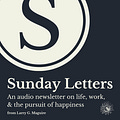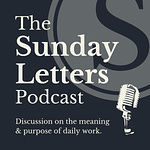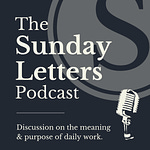To write accurately and succinctly on matters of free will and determinism, one needs to be highly tuned to the task with little or no distraction. It’s bloody complex! in other words. So I intend merely to be brief here, to introduce you to a particular position on the matter. Also, there are many permutations and angles from which to approach the topic, and the writings are extensive. Therefore, I don’t make any claims to accuracy, nor do I seek to bring the broad discussion to a conclusion. That would simply be naive. Nevertheless, given that many fundamental aspects of human interaction depend on the premise that we have at any given moment the choice to act one of a multitude of ways, an exploration into free will is a worthy and interesting exercise. Become A Patron of Sunday Letters
One dominant premise we hold is that we can always choose to do or not to do something. However, as Dennett points out in his 1984 essay “I Could not have Done Otherwise-So What?1”, most often, the question of choice and responsibility for our actions comes about when results are unfavourable. We want someone to accept blame for a given outcome. The legal system is founded on the idea that we are responsible for our actions, and when we break the social and legal code, we should pay the price. It assumes that given we are compos mentis, we always have a choice of how to act. However, when the outcome is favourable, Dennett points out that we don’t question so much in the slightest whether or not the individual could have chosen differently. We accept their assertion that “ah, sure it was nothing” and hardly bring into question their disavowment of responsibility. An interesting point on its own, Dennet suggests, is that when others do well by us, we never question their opportunity to have done otherwise and presents an inconsistency in how we apply the premise.
When we seek to apportion blame or responsibility for an outcome, we tend to focus on a particular portion of the past we perceive led to the event under scrutiny. Dennett calls this “a pocket of local fatalism: a particular circumstance in the relevant portion of the past which ensured that the agent would not have done otherwise no matter what he had tried, or wanted, to do.” According to Dennett, these pockets of fatalism can occur in either a deterministic or indeterministic world. For example, consider Dennett’s example of someone locked in a room. Here, no matter whether or not determinism is true, whether the person was determined to be in the room or not, the person cannot do anything else except be in the room. Whether the actions they take while in the room are determined or not is also irrelevant because they are stuck in the room. It is akin to falling foul to one’s temptations in everyday terms, and due to either our own self deception or lack of will, we cannot control our actions.
A Note on Fatalism, Determinism, and Indeterminism: Fatalism in its overarching position differs from determinism in that it suggests our fate is unavoidable. Determinism suggests that we have no other choice in any given moment than the one at hand. After the fact, we could not have chosen any different than we did. In contrast, indeterminism suggests that no event is certain and the entire outcome of anything is probabilistic.
Whether or not a person could have done anything other than what they did, according to Dennett, is irrelevant when considering moral responsibility. In his book, Elbow Room2, Dennett says, “whatever ‘could have done otherwise’ actually means, it is not what we are interested in when we care about whether some act was freely and responsibly performed.” He insists that whether a person could have done otherwise or not, we still blame or praise them for their actions but only question their motives when it breaks the rules. Why did they do what they did? What caused Joe to kill his wife, for example? Going back to Dennett’s concept of “local fatalism” mentioned above, our investigation into Joe’s murdering of his wife will be bounded by a sequence of recent apparent events. From this, we generally arrive at the assumption that Joe “could have done otherwise,” but is mostly useless in judging moral responsibility. Dennett’s “local fatalism” does not imply determinism. Nor does the lack of “local fatalism” imply indeterminism. According to Dennett, these are fallacies; local fatalism is “entirely neutral between determinism and indeterminism.”
There is a tendency in a written philosophical argument for the original idea to become lost in long winding sentences and paragraphs endlessly placing conditions and clarifications upon conditions and clarifications. And we’re left with the very challenging task of filtering out the main points. Dennett’s short essay, Could not have Done Otherwise-So What?, although relatively easy to follow, is a bit tricky in places and requires (at least for me) several double-takes to get his point.
My conclusion is that there is only a single moment that exists; this moment we occupy. Time is illusory, and the past and future are merely ideas, the past possessing an apparent structure insofar as we have experiences by which to construct it. But the nature of those experiences, given that they are dependent on our psychic structure, dictate our worldview and perception. Linear cause and effect are only apparent, and it offers us an overly simplified version of reality. Complexity rules supreme. Therefore, if I were to view life upon the free will/determinism spectrum, I would lean towards indeterminism. That is to say, I hold that no event is certain, and the entire outcome of anything is probabilistic.
Final Word
For me, the greatest fallacy in these and all considerations on the nature of our reality is that we consider them with all the faculties of ego to be stable. The aspect of humanness that thinks and ponders these things is that which considers itself important and real. But this surface-level self is illusory – ultimately phoney, like an actor playing a part in a movie. But in this case, the actor is so fundamentally engrossed in its role that it believes completely in its reality. The stage is real, other actors, the props and worldly phenomenon and so on, are all real. This is our fundamental mistake.
In the formation of ego Lacan said, for example, the baby’s discovery of itself is an intellectual act; the translation of its mirror image into an idea – the idea of “me” or “self” in a world of things and others3. Lacan claimed that this image was oneself and simultaneously not oneself–an effigy. In this founding act of ego-formation, we construct hypotheses of the world and our place in it.
The unresolvable dichotomy, “do we have free will or is life determined?” is the same question as “do we make it or does it make us?” Is it nature or nurture?” Both aspects are, in fact, complementary, and where that goes on is here and now. We can talk in linear cause and effect terms, and that’s helpful, but this hydraulic version of reality is a function of the ego and we miss too much in that process. We are products of our environment, but we also act upon it. We are born out of it, it makes us, and we, in turn, make it. It is a self-replicating dynamic system with change and mutation at its centre. And in response to “could you have done otherwise?” it seems we are both responsible and not responsible. Yes, I know that sounds ridiculous, and it makes an arse of many of our societal systems, but that’s what happens when we attempt to make concrete that which isn’t.
Finally, on moral responsibility, I’m slowly but surely coming to terms with the possibility that we have no choice. You see, I feel like a bystander, but not a bystander in the sense of feeling powerless. Instead, it feels like I’m along for the ride in a good way. In other words, shit happens, and prediction is impossible so let’s take the good when it comes and also the bad. Suck it up and get on with it. I’ve got to come to terms with my reality and you with yours. I’m here, and so I better get on with it.












208 Moral Responsibility: Could You Have Done Otherwise?